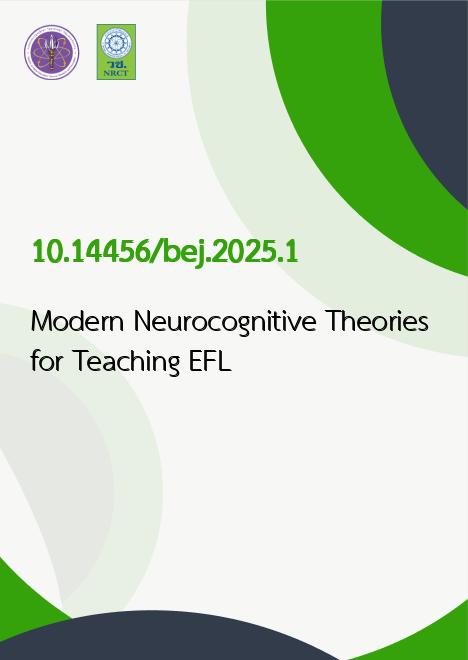
|
Modern Neurocognitive Theories for Teaching EFL |
|---|---|
| รหัสดีโอไอ | |
| Creator | Suphat Sukamolson |
| Title | Modern Neurocognitive Theories for Teaching EFL |
| Publisher | Ph.D. Program in English Language Teaching (ELT), Faculty of Humanities and Social Sciences, Buriram Rajabhat University |
| Publication Year | 2568 |
| Journal Title | BRU ELT JOURNAL |
| Journal Vol. | 3 |
| Journal No. | 1 |
| Page no. | 1-20 |
| Keyword | neurocognitive theories, EFL, traditional learning theories, applications of neurocognitive theories |
| URL Website | https://so14.tci-thaijo.org/index.php/bru_elt_journal/index |
| Website title | https://so14.tci-thaijo.org/index.php/bru_elt_journal/article/view/1377 |
| ISSN | 2822-1311 |
| Abstract | This paper explores the application of modern neurocognitive theories in teaching English as a Foreign Language (EFL). It begins by examining traditional learning theories such as Behaviorism, Constructivism, and Sociocultural Theory, highlighting their contributions and limitations in EFL contexts. Recognizing the need for innovative approaches, the author presents the concepts and principles of neurocognitive theories, which offer evidence-based insights into the processing, storage, and retrieval of language by the brain. Moreover, the paper outlines the similarities, differences, and applications among 20 modern neurocognitive theories, emphasizing their relevance to EFL teaching. Practical applications are presented and discussed in detail, illustrating how concepts or principles such as multisensory learning, spaced repetition, and contextual engagement enhance language acquisition, retention, and fluency. In addition, the risks of oversimplification, the complexity of concepts, and the resource requirements that accompany the integration of these theories into real-world classrooms are examined. The study advocates for the integration of neurocognitive concepts to enhance EFL instruction, providing instructors with empirically supported techniques to promote learner engagement and achievement. The conclusion encourages educators and graduate students in EFL to embrace neurocognitive frameworks for designing effective lesson plans and conducting research, ensuring alignment with the latest advancements in language teaching. |